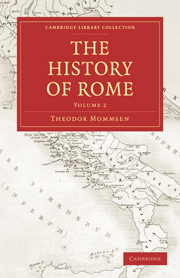Book contents
- Frontmatter
- Contents
- MAP OF ITALY
- BOOK THIRD: FROM THE UNION OF ITALY TO THE SUBJUGATION OF CARTHAGE AND OF THE GREEK STATES
- CHAPTER I CARTHAGE
- CHAPTER II THE WAR BETWEEN ROME AND CARTHAGE CONCERNING SICILY
- CHAPTER III THE EXTENSION OF ITALY TO ITS NATURAL BOUNDARIES
- CHAPTER IV HAMILCAR AND HANNIBAL
- CHAPTER V THE WAR UNDER HANNIBAL TO THE BATTLE OF CANNÆ
- CHAPTER VI THE WAR UNDER HANNIBAL FROM CANNÆ TO ZAMA
- CHAPTER VII THE WEST FROM THE PEACE OF HANNIBAL TO THE CLOSE OF THE THIRD PERIOD
- CHAPTER VIII THE EASTERN NATIONS AND THE SECOND MACEDONIAN WAR
- CHAPTER IX THE WAR WITH ANTIOCHUS OF ASIA
- CHAPTER X THE THIRD MACEDONIAN WAR
- CHAPTER XI THE GOVERNMENT AND THE GOVERNED
- CHAPTER XII THE MANAGEMENT OF LAND AND OF CAPITAL
- CHAPTER XIII FAITH AND MANNERS
- CHAPTER XIV LITERATURE AND ART
- CORRECTIONS
CHAPTER IV - HAMILCAR AND HANNIBAL
Published online by Cambridge University Press: 05 October 2010
- Frontmatter
- Contents
- MAP OF ITALY
- BOOK THIRD: FROM THE UNION OF ITALY TO THE SUBJUGATION OF CARTHAGE AND OF THE GREEK STATES
- CHAPTER I CARTHAGE
- CHAPTER II THE WAR BETWEEN ROME AND CARTHAGE CONCERNING SICILY
- CHAPTER III THE EXTENSION OF ITALY TO ITS NATURAL BOUNDARIES
- CHAPTER IV HAMILCAR AND HANNIBAL
- CHAPTER V THE WAR UNDER HANNIBAL TO THE BATTLE OF CANNÆ
- CHAPTER VI THE WAR UNDER HANNIBAL FROM CANNÆ TO ZAMA
- CHAPTER VII THE WEST FROM THE PEACE OF HANNIBAL TO THE CLOSE OF THE THIRD PERIOD
- CHAPTER VIII THE EASTERN NATIONS AND THE SECOND MACEDONIAN WAR
- CHAPTER IX THE WAR WITH ANTIOCHUS OF ASIA
- CHAPTER X THE THIRD MACEDONIAN WAR
- CHAPTER XI THE GOVERNMENT AND THE GOVERNED
- CHAPTER XII THE MANAGEMENT OF LAND AND OF CAPITAL
- CHAPTER XIII FAITH AND MANNERS
- CHAPTER XIV LITERATURE AND ART
- CORRECTIONS
Summary
Situation of Carthage after the peace
The treaty with Rome in 513 gave to the Carthaginians peace, but they paid for it dearly. That the tribute of the Carthage largest portion of Sicily now flowed into the enemy's chequer instead ot the Carthagniian treasury, was the least part of their loss. They felt a far keener regret, when they found that they had to abandon the hope of monopolizing all the lines of traffic between the eastern and the western Mediterranean, just as that hope seemed on the eve of fulfilment. They now beheld their whole system of commercial policy broken up, the south-western basin of the Mediterranean, which they had hitherto exclusively commanded, converted since the loss of Sicily into an open thoroughfare for all nations, and the commerce of Italy rendered completely independent of the Phœnicians. Nevertheless the peaceful Sidonians might perhaps have been disposed to acquiesce in this result. They had met with similar blows already; they had been obliged to share with the Massiliots, the Etruscans, and the Sicilian Greeks what they had previously possessed alone; even now the possessions which they retained, Africa, Spain, and the gates of the Atlantic Ocean, were sufficient to confer power and prosperity. But in truth, where was their security that these at least would continue in their hands?
- Type
- Chapter
- Information
- The History of Rome , pp. 84 - 111Publisher: Cambridge University PressPrint publication year: 2010First published in: 1862

